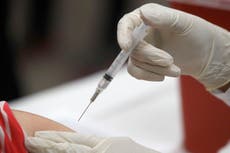When are children eligible for the nasal spray flu vaccine?
Influenza on the rise among under-15s as autumn hits, UKHSA warns

Flu season is upon us once more and the virus is currently most prevalent among young children in the UK, with a positivity rate of 12 per cent among five to 14-year-olds, according to the UK Health Security Agency (UKHSA).
That makes them the most vulnerable group in the country, ahead of 15 to 44-year-olds at 9.6 per cent.
Hospitalisation rates for influenza are also highest among infants and children aged four and under, at 3.19 per 100,000 people, with the second most at-risk group being older people aged 85 and above (2.48 per 100,000).
“Hospital admission rates for flu have increased in recent weeks and remain highest in those under five,” said Dr Conall Watson, consultant epidemiologist at the UKHSA.
“Already this year a small number of young children have needed intensive care. Please book your pre-schooler in for a flu vaccine at your GP surgery as soon as you can.
“Flu nasal spray vaccine is also currently being offered to all primary school children and will be available for some secondary school years later this season.”
The NHS states that the nasal spray flu vaccine is “safe and effective” and is necessary not only to protect children but to shield others, given that they can catch and spread the virus with ease in classrooms, school playgrounds and nurseries.
The vaccine is administered as a spray squirted up each nostril and is both a quick and painless process, although it can take up to two weeks to take effect, according to the health service.
The spray is free on the NHS to children aged two or three as of 31 August 2022 (born between 1 September 2018 and 31 August 2020), to all primary school children (from Reception to Year Six), to some secondary school-aged children and to others between two and 17 with long-term health conditions.
Infants aged between six months and two years old with a pre-existing health condition will be offered the vaccine as an injection rather than a spray, an alternative also available to other eligible youngsters in the event that the simpler means of administration proves unsuitable.
Children aged two or under will be treated with the vaccine at their GP’s clinic while those in primary or secondary education can have it administered by a nurse at school, or at a community clinic or immunisation centre in the event that they are homeschooled.
The only circumstances in which a child should not receive the spray is if they are unwell on the day of their appointment, for instance with a blocked or runny nose or a high temperature, in which case they should wait until they have recovered.
In rare cases, the recipient of the spray might experience some mild side effects, such as a runny or blocked nose, headache, tiredness or a loss of appetite, while those who have the injection might feel a slight aching of the muscles or a sore arm, but these conditions should pass in a day or two.
Join our commenting forum
Join thought-provoking conversations, follow other Independent readers and see their replies
Comments


Bookmark popover
Removed from bookmarks